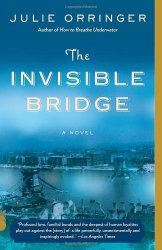 I had high hopes for The Invisible Bridge, a book club selection, others in our group who already read it loved it. Unfortunately, I’m not one of them.
I had high hopes for The Invisible Bridge, a book club selection, others in our group who already read it loved it. Unfortunately, I’m not one of them.
The story of a Hungarian Jewish family centers on their middle son prior to and during World War II. But for the first three parts, it’s really not about the war or the holocaust at all, it’s basically a sappy and unbelievable love story with some Hungarian and French anti-antisemitism thrown in, which unfortunately, we’re getting on the news today, no need to travel back 80+ years. The last two parts took us through the war years with your standard stories of work details, air raids, starvation and only cursory mentions of experiences at concentration camps like Auschwitz and Buchenwald. Don’t get me wrong, I wasn’t in anyway looking forward to reading about experiences in either of those camps, but with the focus entirely on the middle son, mentions of other experiences during the war and even major character deaths were almost merely footnotes, brief mentions, like their names on lists that marked their deaths.
Here’s my real issue though. The author writes beautifully and is able to create images of scene incredibly well (some images of Paris and Budapest will stay with me for a long time), I only wish she had the same skill with character and plot development. The good guys were so good and the bad guys so bad (right down to nasty scars on their faces that marked them as such) that it all felt flat. Furthermore, by telling the story as an omniscient narrator, she gave us information that the characters should never have had and yet did. For example, the reason Klara left Budapest (I don’t want to be specific without a spoiler alert). I also cannot stand when an author tells us how great a character is and how everyone loves him (e.g., Tibor), over and over again. Don’t tell us, show us. Let him live his life, speak his words and let the reader decide if he’s the mensch you want us to think he is. The only multi-dimensional character to me (the one I couldn’t necessarily predict) was Josef, Klara’s brother. A handsome, spoiled playboy, he did have tendencies towards good. But even in the end, while I could almost buy his last selfish act, I couldn’t then buy his sudden and immediate redemption. Again, like other characters, it felt too canned, too convenient. As I’m writing this, I realize there are so many examples of character one dimensional-ness used to push the story forward, I could be here all day.
Speaking of story, it wasn’t horrible, just too long, at 760+ pages, so much more could have been done with it (I personally, think the post World War II story would have been so much better as that’s a time in Hungary’s history I think few of us know), if the author wasn’t so damn repetitive all the time (e.g., how many times must we return to the life of theater director, Zoltan to know it doesn’t end well) and trying to cram so many different WWII experiences into the plot (really, Polaner’s return, the younger brother’s experience crammed into the end), I can’t help wonder if a good editor would have helped. As it is though, I found it a horrible chore to get through that unfortunately, ate up a huge chunk of my summer reading time.
